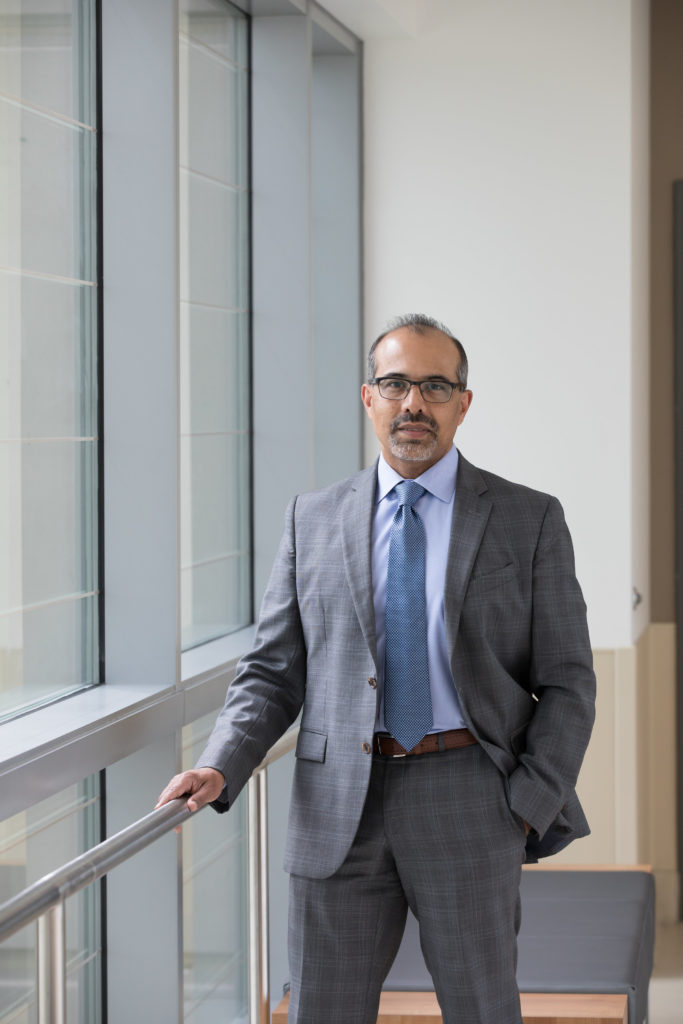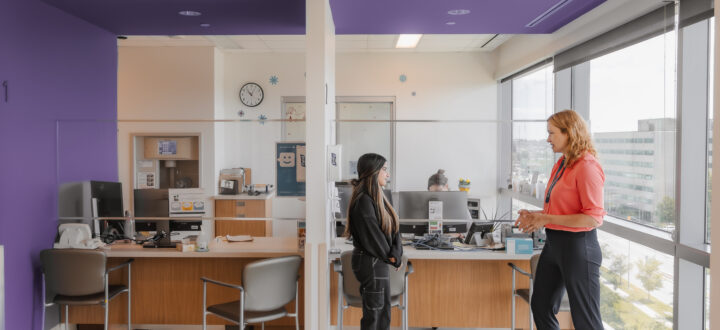Dr. Sonu Gaind, Chief of Psychiatry / Medical Director of Mental Health
The new Humber River Hospital is on October 18, 2015. As one of the largest acute care hospitals in the GTA, it will offer programs and services to treat a wide variety of patients. The move to the new Humber River Hospital is going to be a big change for this community! So, every month, we’re checking with the hospital’s programs and services to learn more about the care they offer, their staff, and what’s going to be different at the new hospital.
Dr. Sonu Gaind is the Chief of Psychiatry/Medical Director of Mental Health at Humber River Hospital, an Associate Professor at University of Toronto, and Board Member and President-Elect of the Canadian Psychiatric Association.
Tell us about Humber River Hospital’s Mental Health program. What makes it unique?
 We have a strong and diverse Mental Health program at Humber River Hospital. It’s one of the largest in the GTA, with 50 adult inpatient beds, 6 child inpatient beds, and 4 dedicated emergency room beds. We see over 50,000 outpatient visits per year. We offer a wide range of services including outpatient and inpatient care, consultation-liaison support to the rest of the hospital, and a chemical dependency program.
We have a strong and diverse Mental Health program at Humber River Hospital. It’s one of the largest in the GTA, with 50 adult inpatient beds, 6 child inpatient beds, and 4 dedicated emergency room beds. We see over 50,000 outpatient visits per year. We offer a wide range of services including outpatient and inpatient care, consultation-liaison support to the rest of the hospital, and a chemical dependency program.
Our Children’s Mental Health program offers the full spectrum of care, from inpatient to outpatient and transition care programs, and we have an on-site classroom in collaboration with the Toronto District School Board.
Our Psychogeriatric Outreach team is highly regarded in the GTA. Our team visits older adults living in facilities in the community and assesses mental health and dementia related concerns, from an interdisciplinary perspective.
We also have a Mobile Crisis Intervention Team that works alongside local police divisions.
Humber River Hospital is unique in that while we are not a specialized research hospital, we’re a huge community hospital with strong dual academic affiliations – to both the University of Toronto and Queen’s University, and those will only strengthen as we move to the new site. The broad range of patients we see and the care we deliver provides an ideal learning environment for students and trainees. Additionally, in keeping with our vision of an academically affiliated community hospital, as we develop our programs our planning is academically informed on ‘best practices’ while remaining practically relevant to positively impact ‘real world’ patient care.
What is the vision for Mental Health at the new Hospital?
For the past year we’ve been working towards a model of care in the Mental Health program at Humber River Hospital built on three pillars.
The first is Engagement – at every level! Starting with our own department, and extending out to our colleagues in the hospital, patients, and outside programs and the community. For example, we offer educational Clinical Days that are multidisciplinary and open to other organizations and hospitals. We work with community organizations like Griffin Centre and York University and are working to build more relationships.
The second is Integration and Collaboration. We want care to follow patients, rather than the patient chasing care. This means a patient will get care where they need it – do they need mental health support on a medical inpatient floor? We’ll come to them. Given the realities of providing a range of care in a large institution, this is a complicated system to put in place, but we’re working with our medical colleagues to make the patient’s experience as seamless as possible.
The last is Excellence. Naturally delivering excellent patient care is the cornerstone of why we are all here, and we’ll continue to build on our strong foundations. Beyond that though, we are also building excellence in community hospital focused teaching, education and academics, and in system planning. And through this all we want to make sure that these programs are developed in a way that leverages our strengths as a community hospital, and are conducted in a way that can be evaluated for impact.
What is going to be different at the new Hospital?

The Mental Health & Addictions Program’s Rooftop Garden
Being consolidated at one hospital site will make a significant difference for us, especially in the mental health program. Because patients may be receiving Mental Health care while receiving other care at Humber River Hospital, being at one site will make everything more integrated and seamless for patients. We can support hospital departments far better when care is no longer fractured across multiple sites. For example, currently a patient will go to the Emergency Room at Church site, but in order to be admitted for inpatient care, they need to travel to the Keele site.
The Emergency Room at the New Humber River Hospital has a dedicated mental health unit and team, and for patients needing admission the process will be much more streamlined than it is now. We will also be launching a new Urgent Care Clinic. This will help fill gaps in the current system, so people needing quick follow-up but not requiring admission will be able to access timely care.
We’ll also have more space for programs and patients, including rooftop gardens for our mental health inpatient units. Finally, we’re looking at other opportunities to improve care that our transition to the new digital hospital opens up. Our mental health program was the first to ‘go live’ with our new electronic CPOE/PDOC system, and we’ve learned a lot from that experience. We’re already planning to build telemedicine services we provide through OTN (the Ontario Telemedicine Network), and we’ll be watching for other opportunities as we move along.
Tell us about the most interesting feature or piece of equipment that we’ll find in the new Hospital’s Mental Health program:
In Mental Health, our equipment doesn’t have knobs or dials. It has faces. Our equipment is our great people.
Just like a surgeon can’t do their job without a scalpel, we can’t do our job without talking with and understanding people. Our whole multidisciplinary team is essential to doing that. We want to build on our interdisciplinary capacity and support our patients in the best way we can.
Why do you donate to Humber River Hospital?
I donate because I know firsthand that we have an excellent mental health program here at Humber River Hospital, and with transition and a renewed focus on improved program planning I can see the tremendous potential ahead of us. Donating is an opportunity to make our program even better. Donations help build our resource capacity, allow us to offer more diverse support to our patients and to build our programs.
Why should others get excited and donate too?
It’s really a unique point in time. The interest in mental health has never been higher, and we’re poised on the eve of an exciting transition to our new hospital. You have the opportunity to support a great Mental Health program in your community, and help make it even better. By making a donation and raising awareness for Humber River Hospital and our Mental Health program, you can help break down stigma and help patients get lifesaving care in their time of need.






